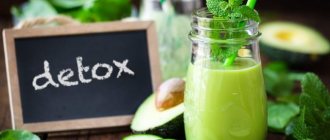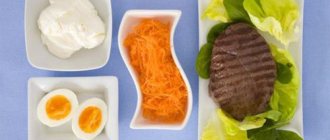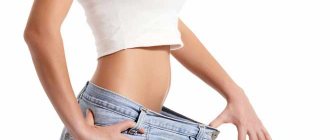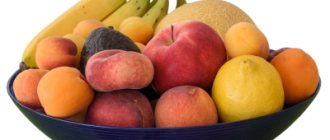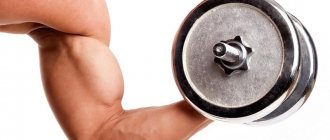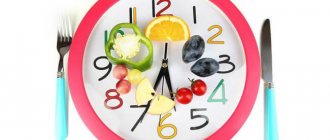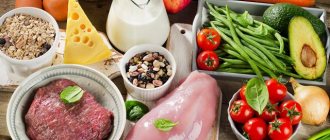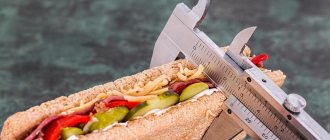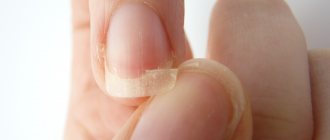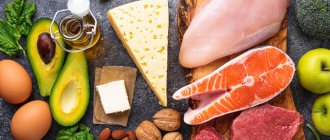Today I will tell you what a protein diet is and how to follow it correctly. First, it should be noted that this type of diet can be considered one of the most effective for weight loss.
The best results with a protein diet can be achieved by combining it with physical training, which should be done at least three times a week. It should also be taken into account that with this method of eating, food must be taken six times a day.
It is noteworthy that this protein diet involves the exclusion of carbohydrates and fats from the diet. Good results from this diet are achieved due to the high protein content in the menu, which, like vegetables and fruits, is rich in fiber, mineral compounds and all essential vitamins.
Weight loss technique
The essence of such weight loss is that the body is in a state of peculiar stress. Carbohydrates, which are a source of energy, are excluded from the usual diet. This leads to so-called energy deficiency and metabolic restructuring.
Despite the fact that the amount of food consumed is not significantly reduced, the lack of carbohydrates provokes the body to burn glycogen reserves. Already from the first days of a protein diet, you can notice weight loss, but you need to understand why this is dangerous, because first of all, excess fluid is lost. Fats will be used by the body as an additional source of energy much later.
The method of such weight loss is not complicated, but requires adherence to strict rules.
Important! Doctors and nutritionists note the dangers of protein diets, and do not recommend getting carried away with this method of losing weight for more than two weeks. You can repeat the course no earlier. than in a year.
The effect of excess protein on the body
The protein diet is the basis of the popular Dukan diet and the Kremlin diet. It helps to significantly reduce body weight by eliminating sugar and simple carbohydrates, limiting the consumption of saturated fats, and reducing the caloric content of the daily diet. At the same time, the consumption of protein foods increases significantly.
Proteins (proteins) are vital for humans. They make up the bulk of the dense substances of muscles, supporting tissues and protective formations (hair, nails). They make up immune bodies that protect the body from infections. The body does not know how to accumulate proteins, so a person must constantly eat protein foods.
But for the normal functioning of all systems and organs, fats and carbohydrates are no less necessary. Carbohydrates are the main source of energy necessary for the functioning of all organs, cell growth and division. The functioning of the brain, respiratory system and testosterone production in men depend on saturated fats.
Without receiving vital substances from food, the body faces a deficiency. Due to lack of nutrients, he finds himself in an extreme situation. Trying to replenish missing carbohydrates, a person first uses up their own reserves (glycogen), accumulated in the muscles and liver. Then the stored fat reserves are used up.
What can be the consequences of a protein diet?
Do's and Don'ts
As with any diet, for a protein diet there is a set of foods that must be excluded from the diet. These primarily include those that contribute to the rapid formation of fat deposits.
- First of all, this applies to everything sweet. Cakes, pastries and other confectionery products are prohibited. It is recommended to exclude even sweet fruits from the diet.
- You should not eat baked goods, pasta or flour products.
- During the diet, you will have to forget about fried foods and various sauces for them.
- You should not include potatoes, grains and legumes in your diet.
- You should also refrain from consuming animal fats (butter, etc.).
- Completely eliminate alcoholic, sweet and carbonated drinks.
Products that must be on the table:
- lean meat of any kind - poultry (exclude the use of poultry skin), veal, beef, rabbit.
- various offal - beef and chicken liver, lamb or veal tongue.
- all types of fish and seafood, canned food, crab sticks.
- eggs in any form - fried, boiled, omelettes.
- low-fat dairy and fermented milk products.
- bran, oatmeal.
- dried apples and unsweetened pears.
- sweeteners.
- vegetables, tomatoes and cabbage are especially welcome.
- various greens.
- one and a half liters of fluid per day.
How to Convert Food Weight to Protein
A lot of protein can be found in meat, fish, eggs, dairy products, legumes, nuts and various seeds. In addition, there are some vegetables that are also rich in protein content, for example, broccoli contains 40 grams of protein in a small serving, which is equivalent to the protein in two meat cutlets or 120 grams of chicken breast.
It's worth considering all the protein sources you eat to maintain healthy protein levels in your diet and aim for 1 to 1.5 grams of protein per day. For this purpose, you can write down everything you eat during the day, but it is better if you use automatic calculators, of which there are quite a lot on the Internet or in smartphone applications.
To roughly estimate the level of protein in your diet, you can use these data:
- Red meat, pork, poultry and seafood contain approximately 6-9 grams of protein per 30 grams of weight. This means that one serving of meat, in the form of a 90 gram patty or steak, provides about 25 grams of protein.
- One egg contains 6-8 grams of protein. Therefore, a two-egg omelet with a slice of cheese can provide up to 20 grams of protein.
- Nuts and seeds show a protein content of 4-8 grams per ¼ cup.
- Cooked beans, lentils and other legumes provide approximately 7-8 grams of protein per ½ cup.
- Porridges made from grains of wheat, rye, and barley allow you to get 5-7 grams per 200 gram serving.
- Fresh vegetables contain 1-2 grams of protein per 30 grams of weight.
Attractive aspects
The popularity of protein diets is due to their undoubted advantages.
- Weight loss becomes noticeable in the first days;
- The diet is very varied and allows the body to be fully satisfied during each meal;
- Proteins take longer to be processed by the body, so the feeling of hunger will not haunt you every minute and the risk of losing your temper and switching to fattier foods is minimal;
- As part of this diet, you do not need to constantly scrupulously count calories and measure portions with an accuracy of grams;
- This diet is great for muscle growth, and bodybuilders can follow it to dry their bodies.
- The absence of constant hunger leads to only minor manifestations of the side effects characteristic of many diets - headaches, sleep disturbances, nervous stress and excessive fatigue.
- Fiber, contained in vegetables recommended for consumption in almost every protein diet, has a healing effect on the digestive system and the body as a whole.
Contraindications to the Dukan diet
- Age less than 18 years;
Pregnancy planning;- Pregnancy and lactation;
- Menopause;
- Chronic diseases of the stomach and intestines;
- Cardiovascular diseases, hypertension;
- Any kidney disease;
- Gout;
- Oncopathology and precancerous diseases;
- Protein metabolism disorders.
General cons
In addition to the benefits described above, a protein diet, the harm of which cannot be denied, has several serious disadvantages.
- There can be no question of a balanced protein diet, which is why it is harmful in the first place. The body will lack important vitamins, minerals and various trace elements. Therefore, you cannot adhere to this type of diet for a long time.
- The predominance of protein products, coupled with a restriction in carbohydrates, affects the tone of the body and leads to rapid fatigue.
- Another disadvantage is that fat burning occurs last with this diet.
- The kidneys are under greater stress, which can lead to disruption of their function.
- Possible increase in cholesterol.
- The harm of a protein diet for women is more obvious, because Due to a lack of calcium, problems with hair, nails and skin may occur.
Other effects of a protein diet
When protein is broken down into amino acids, ammonia is produced in the body. It has a negative effect on the nervous system. When consuming large amounts of protein, the amount of toxic ammonia increases to critical levels, causing increased nervous excitability.
A protein diet forces the liver to work in extreme mode. Metabolic disorders threaten the emergence of a predisposition to diabetes. The lack of essential polyunsaturated fatty acids makes blood vessels fragile.
Additional calcium is needed to process excess protein. It is washed out of the bones and they become brittle. Over time, osteoporosis may develop. Brain function deteriorates, a person cannot concentrate, and constantly forgets everything.
A protein diet is especially harmful for women. They may have problems conceiving. Decreased fertility is associated with the accumulation of protein breakdown products in the genitals, which interfere with fertilization.
Excess proteins can cause muscle cramps. Lack of the required amount of vitamins in the diet leads to decreased immunity and vitamin deficiencies. A protein diet depletes the body's resources.
Studies have revealed an increase in N-nitroso compounds in people following protein diets. These substances have been linked to the development of cancer.
Who is suitable and not suitable
This diet is an excellent solution for people who want to lose weight, but do not want to give up meat.
Important! This option is one of the best choices for athletes looking to gain muscle mass. Eating protein has a beneficial effect on the growth of muscle tissue.
This method of losing weight is unlikely to suit lovers of sweets. Statistics show that after finishing the diet, most people again begin to eat foods high in complex sugars. This leads to the fact that the lost weight is immediately returned, moreover, the kilograms continue to be added.
In addition, a protein diet has contraindications. It is recommended that older people avoid it. This type of diet is fraught with increased blood clotting, which can lead to the formation of blood clots.
What can you add to your protein sources?
In addition to our usual protein-rich foods, it is worth paying attention to other sources of protein, which are rich in other substances. Eating these foods can help you gain additional health benefits:
- Hemp seeds: Contain about 33% protein, can provide 11 grams per three tablespoons of seeds; Moreover, they contain 20 amino acids in an easily digestible form and are filled with Omega-3 fatty acids
- Chia seeds : Contain approximately 14% protein, providing about 4 grams per three tablespoons
- Spirulina : the richest in proteins - almost 70% protein by weight of the product; provides 6 grams of protein per 10 gram serving; contains 18 amino acids and is rich in iodine.
- Sprouted plants : provide very high-quality protein, and bean sprouts are richest in fiber content. At the same time, sprouts can help obtain iron and chlorophyll, which are found in the largest quantities in bean sprouts.
- Bee Pollen : Offers 40% protein by weight of the product, but it is impossible to eat significant amounts of pollen, so it is worth considering it as a good addition for a variety of protein and amino acid sources.
Information sources
- www.webmd.com
- https://supertracker.usda.gov
- www.ncbi.nlm.nih.gov
- https://jamanetwork.com
- https://nutritiondata.self.com
The information on this site has not been evaluated by any medical organization. We do not seek to diagnose or treat any disease. The information on the site is provided for educational purposes only. You should consult your physician before acting on information from this site, especially if you are pregnant, nursing, taking medications, or have any medical condition.
Rate this article
Average 4.3 Total votes (6)
What problems are possible
Based on numerous positive reviews, it is wrong to make a decision to switch to a protein diet. Girls who want to go on such a diet for weight loss should be aware of the possible negative consequences, and before starting the diet, decide whether it is harmful.
- Protein products, in particular meat, are more difficult to digest if there is a lack of carbohydrates and fiber. This leads to the fact that foods remain in the intestines for a long time, as a result of which toxins are released and cholesterol levels in the blood increase.
- You may experience bad breath, slow digestion of food, or even “rotting.”
- Due to the fact that weight is lost quickly enough, such an unpleasant effect as sagging skin may appear - it does not have time to quickly take on a new shape. To eliminate this phenomenon, intense physical activity is required to give the skin the necessary elasticity.
- Swelling of the limbs and the appearance of unaesthetic bags under the eyes are possible. This is the first sign that the body is experiencing a disruption in the functioning of the kidneys, and you are one of those for whom a protein diet is contraindicated.
- One possible side effect is constipation due to slow digestion of food.
- Cold protein dishes contribute to the development of gastritis and enterocolitis. Acute stomach pain is one of the first symptoms of these diseases.
- Also disadvantages include a lack of calcium, which provokes a deterioration in the condition of hair, nails and bone fragility.
- You should know that a protein diet can lead to infertility, hormonal imbalance, inflammation of the appendages and dysfunction of the ovaries, which is very dangerous for women.
Nutrition rules
In order for food to bring maximum health benefits, it is necessary to use the correct approach in its preparation :
Under no circumstances should you fry anything. Cooking in a frying pan without oil with a special coating is allowed. But even with this option, foods, especially meat, can release their own fats, which, when heated at high temperatures, form carcinogens.- It is advisable to eat vegetables raw or boil, stew or bake without oil in foil. You can also use your home grill for cooking.
- To give food a special taste, use soy sauce, vinegar of all kinds, salt and pepper.
Useful tips
A few simple tips will help you go through any protein diet easily and stay healthy at the same time.
- Before choosing this method of losing weight, you need to find out whether it suits your body and whether there are any contraindications. To do this, you should undergo a medical examination.
- Consultation with a doctor or nutritionist is required. You can start a diet only after permission.
- An important point is to take multivitamins. This is extremely necessary for health.
- If excessive weakness or dizziness occurs, the diet should be enriched with carbohydrates, for example, a portion of oatmeal.
- If your health does not improve, you should immediately stop losing weight.
- You should not combine diet with medication.
Attention! For those using this diet, moderate physical activity and frequent exposure to fresh air are recommended.
Doctors' recommendations to help reduce the harm of your diet
Nutritionists give some useful tips that will reduce the harm from a protein diet and bring more benefits to the body than trouble. Since animal fats contribute to the appearance of cholesterol plaques in the blood and blood vessels, it is necessary to dilute animal foods with plant foods. Most of the daily protein intake should come from plant proteins obtained from nuts, soybeans, peas, corn, mushrooms, legumes and other plants containing protein.
The choice of products for the daily diet should be as balanced as possible, and the cooking method should not include frying in oil, even olive oil. It is better to boil or steam fish and meat; with this processing, these products are better absorbed and provide more beneficial substances than harmful ones. All products must have minimal fat content and sufficient protein.
It is necessary to monitor the consumption of simple carbohydrates, choosing those that have many nutrients and are rich in fiber. These include vegetables, fruits, and whole grains.
Before starting a dietary nutrition program, consultation with a doctor is mandatory, especially for those who have kidney problems, diabetes or any other chronic diseases.
When starting to lose weight through a protein diet, you should remember to strictly adhere to the water regime. The norm of clean water consumed per day is 30 g per kilogram of weight, but not less than 1.5-2 liters per day.
People seeking to lose weight need to clearly understand that a protein diet is not a panacea for obesity, but only a way to lose a few kilograms of weight in a faster way. But they promise to return very quickly if you return to your previous taste habits and diet. If you are not going to review your diet in the future, maybe then you shouldn’t put your body into a stressful state?!
The right way out
In order for the achieved effect to last for a long time and the extra pounds not to return, you need to adhere to proper nutrition even after finishing the diet. Don't dramatically increase your portion size.
Products that were previously prohibited should be added to the diet gradually (for example, a small amount of alcohol is allowed only on the fifth day after leaving the diet).
It is better to limit the consumption of sweets and flour. Vegetables and fruits are a good alternative.
The diet should contain enough cereals, meat, dairy and fermented milk products. If you continue to exercise, not only will the weight not return, but your body will also gain sculptural definition.
How to get out of a diet
Eating protein foods is a fashionable development of modern nutritionists. It has already shown its effectiveness and has received many admirers. But you can only follow the diet for 2 weeks. Then you need to wisely switch to a rationally calculated diet so as not to gain weight.
To effectively exit a protein diet, you need to:
- divide meals into 5 times, eat small portions;
- be sure to have breakfast in the morning;
- have dinner no later than 3 hours before bedtime;
- drink at least 1.5 liters of clean water per day, preferably drinking water before meals;
- include raw and cooked vegetables, as well as raw fruits in your diet.
Food with a varied content of microelements will give the body energy and vigor.
Reviews
Natalie: “The diet menu is quite extensive, there is no monotony, which is good news. A huge plus is that you don’t feel hungry all the time. The result becomes noticeable within 3-4 days. I periodically return to this diet to tighten my figure.”
Julia: “My health worsened on the third day. I began to constantly have headaches and muscles, and experienced a loss of strength. I encountered such an unpleasant side effect as putrid breath. I quit the diet abruptly. The lost kilograms did not take long to appear and immediately returned. This diet doesn’t suit me.”
Tamara: “I followed the diet for exactly two weeks. I managed to lose 5 kilograms. For me, this is a pretty good result, since I am not particularly overweight. The only negative is that due to the lack of carbohydrates, I felt some weakness, sometimes I had a headache and a couple of times there were attacks of apathy.”
Sample menu for a week for weight loss
An approximate menu of a protein diet for weight loss for a week will help you decide on your diet. Take the indicated dishes as a basis, but adjust them yourself, taking into account the lists of prohibited and permitted foods.
| Day | Breakfast | Dinner | Dinner |
| 1 | Cheese omelette, green tea | Beef stew with buckwheat | Boiled fish |
| 2 | Low-fat cottage cheese | Boiled chicken breast, cucumber and tomato salad | Scrambled eggs, green tea |
| 3 | Oatmeal on water | Stewed veal with zucchini | Baked salmon with lemon and herbs |
| 4 | Curd cheesecakes | Rabbit in sour cream sauce, brown rice | Steamed ground turkey cutlets |
| 5 | Toast with cheese | Fish soup with rice | Beef tenderloin baked with soy sauce |
| 6 | Low-fat cottage cheese, apple | Stew of veal, carrots, cabbage and zucchini | Caesar salad" |
| 7 | Buckwheat | Chicken soup with meatballs | Fish casserole |
What to eat as snacks:
- boiled eggs;
- kefir;
- natural yogurt;
- apples, grapefruit;
- cheese;
- cottage cheese pancakes and casserole;
- vegetable salad.
Every day you should have 3 full meals and 2-3 snacks. Before going to bed, 2-3 hours before going to bed, you can drink a glass of kefir, tea or eat natural yogurt. Food should be as light as possible so as not to feel unwell due to indigestion and a full stomach.
If you play sports, take additional protein shakes. Choose foods that are free of sugar and additives. This cocktail will relieve the feeling of hunger and will not cause weight gain.
Return to article content
Protein functions
Protein itself is a useful element. First of all, it is a building material for all cells of the body. In addition, it is responsible for hormone synthesis and accelerates chemical reactions.
Also, thanks to protein, nutrients reach those cells that need it. Also, do not forget that protein fights infections and improves immunity.
